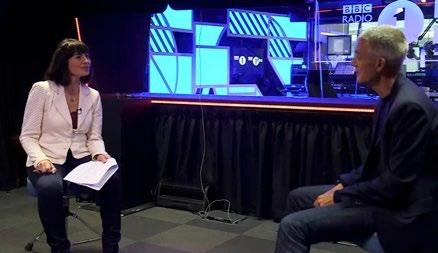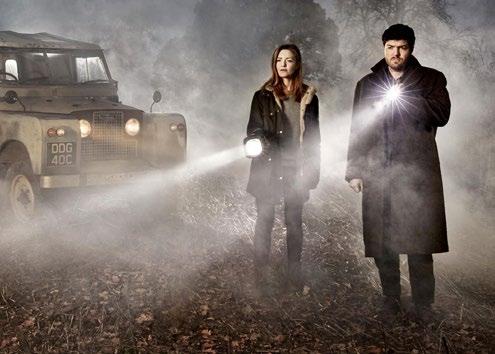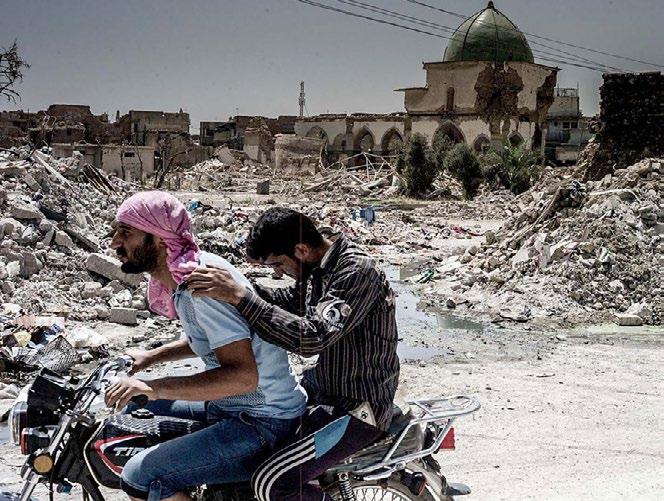
13 minute read
A BBC for everyone
To say that Tim Davie has hit the ground running is an understatement. In his first week as the BBC’s 17th Director-General he delivered a remarkably candid speech setting out clearly his values and agenda. A fortnight later, he was the first speaker at the RTS’s Digital Convention 2020, when he was interviewed by the Society’s CEO, Theresa Wise.
Looking much younger than his 53 years, a consequence of his new buzz-cut hairstyle, the noticeably plain-speaking Davie cut a refreshing figure. He covered a wide range of topics, such as diversity, impartiality, competing with the tech giants, increasing revenue from the BBC’s commercial activities, BBC pay and the corporation’s important role as a global ambassador for Britain.
Advertisement
He also argued that the BBC’s policy on abolishing free licences for those over-75s who do not receive pension credit was correct. Throughout, he stressed that the BBC needed to be valued by all licence-fee Tim Davie insists that the BBC must payers, regardless of where they lived in the UK or their social class. “We’ve serve all licence-fee payers, regardless got to deliver for every household. Us of who they are and where they liveoffering value is not just a line,” he insisted, mindful, perhaps, of his own RTS background in south London, where he was the first member of his family to attend university. “It has surprised me that this has become part of me – focusing on making sure that every member of the public really gets value A BBC for from us. That’s what I’m about.” What does a modern public service broadcaster look like – and how does this differ from what the BBC has been doing to date, asked Wise. “What I’m about is evolution, not everyonetrying everything out. One of my messages is that you have to evolve things to protect them.” “We’re not trying to beat Netflix.… the BBC for an average of 18 hours a
He added: “I want people to think It’s about whether we are truly valued week. But there are certain bits of the deeply about what’s important in this and essential, and whether the BBC country – and it’s not as simple as age market, what’s important for us in the feels indispensable – not for every – that don’t necessarily feel the BBC is UK? What do people genuinely care hour of your media consumption but for them. It’s not as straightforward as about in the BBC? for part of it.” saying, ‘It’s the under-35s’. It’s often
“There is good news for the BBC. In Were some audiences underserved about your life circumstances, where this world, I don’t think there’s been a by the BBC? “Absolutely. The BBC you are, where you live.... better time for proper impartial news doesn’t deliver equally to everyone. “The BBC is extraordinary in how it’s or proper local, regional storytelling. You’re never going to quite get that right. connected with an enormous number
“With such incredible competition, There are some people who are getting of people across the UK. We’ve still got you can’t take an audience for granted extraordinary value from the BBC. a real bedrock of support to justify a any more. The BBC has to be truly “The overall numbers are pretty universal fee, but I did say [recently different and differentiated. good: 91% of the population come to that] we don’t have an inalienable right
to exist. That is under pressure. There are audiences that, in a diverse Britain, feel a little bit further away from us.”
How did he square the fact that he wanted the BBC to appeal to the whole of Britain while, at the same time, cutting 450 newsroom jobs in the English regions? Did he worry that some regions, such as the North East, might get left behind?
“You worry, of course, because you want to make sure you have the provision. By the way, local and regional programming is utterly critical to us.
“Let’s be clear, the metric here is not how many people we employ, it is the value to audiences. Every area of the BBC has to find efficiencies, which doesn’t mean I am diluting anything, it just means I am doing it better.
“There is a sense that the BBC could be more efficient in many areas – and it has done some good work, so this isn’t the new guy coming in and saying it’s all overstuffed with this, that and the other. The fact is that we’ve got a lot better over the years at being more efficient, but there are areas – and the regions is one of them.… A couple of facts: we will still have well over 2,000 people in the regional news group, where we do around 3,800 hours of coverage, which will remain the same.
“It’s not as if we’re going to be a small player. I would like to look at local news provision as part of the 2022 discussions [concerning the next five-year licencefee settlement] to say, ‘Going forward, how could that evolve?’
“This is not just about the slow stripping of areas, I think we can grow.… More than anything, it’s about audience value. I want people in the North East to feel the BBC is for them.”
Turning to diversity, Wise said that CEOs everywhere were striving to improve the diversity of their workforces in terms of minorities and socio-economic groups. How would Davie effect real change in this regard at the BBC?
He emphasised that “talk is cheap”, and that action on greater representation of disadvantaged groups at all levels of the BBC was essential. “One of the things that everyone in this industry should do is go back and read the speeches from 10 years ago. It’s a sobering experience.”
He added: “There’s been incredible progress on-screen but internally – and senior leadership is critical to this – progress and the speed of change has been slow.… Talking bluntly, a lot of people lower down the organisation look at it and go, ‘Great intent, but I can’t do that’ or, ‘I don’t really believe it’s going to happen.…’
“This is mission critical. Everything that goes on at the BBC – including editorial decision-making – is utterly dependent on having a truly diverse team. I was very blunt in my first words [to staff]: don’t hire in your own image and there can’t be a ‘BBC type’ or we’re in real trouble.”
Davie said he intends to create a “50-20-12 organisation”, a reference, respectively, to the proportion of staff who are female, from BAME backgrounds or are disabled.
He added: “Truly, it’s about leadership and accountability. I have been very direct with BBC leaders and told them they will not get promoted without us assessing how happy their staff are and how they’ve delivered against diversity targets.”
On the problem of the gender pay gap that has caused great controversy at the BBC, he indicated that there was more work to do, but it was wrong for the BBC to beat itself up on this issue “when we’re often a lot better than the [rest of the] industry”.
Wise pointed out that Sarah Sands, who left the BBC this summer after editing Today, recently criticised what she said were the huge differences between producers’ and presenters’ salaries. What did Davie think of this discrepancy?
“As CEO, there will be presenters earning more than me, but that’s normal in the TV world. We could name a number of other [industries] – finance, football – with [high pay for some talent]. It can sometimes be a bit uncomfortable, but we’re trying to get value within a market. We don’t exist fully in a bubble....
“We try and get a discount [but] we want to pay fairly. And there is a market. I recognise the dynamics of this, but I don’t think the solution is to say, ‘We’re going to equalise pay between different job types’. That doesn’t work for me.”
Tim Davie (right) being interviewed by Theresa Wise

RTS
A less contentious area for the BBC is the so-called “soft power” that it wields on the global stage, which the corporation has argued is even more vital in the era of Brexit. Did Davie agree?
“It’s never been more important,” he said. The unique strength of Britain’s creative industries was “not a random occurrence”: it depended on public interventions, exemplified by the BBC, and successful commercial businesses, such as Sky.
“Sky’s is an incredible model, and part of that is [due to] our reputation across the world for trusted content and quality, and, specifically, the BBC, with 468 million weekly users of our content.... One of the things the BBC stands for [globally] is trust and veryhigh-quality content. I think other companies benefit from that.… We are thankful for some government investment [Foreign Office funding for the World Service]. We’d like more in this area and that’s what we’re trying to do. We’re trying to build it.
“I would love to see 1 billion people �
Lessons from the crisis
QTheresa Wise: Will the changes to the BBC’s way of working due to the pandemic lead to lasting change?
ATim Davie: The learnings we’re getting from Covid are such a strange combination. Stating the obvious, we won’t be in a position where everyone is coming in five days a week. We’ll have more flexible working patterns and be thinking about how we use our buildings differently.
We are a production business and a news operation so, at the end of the day, we need people in, but we’ll take some learnings. I suspect a lot of leaders have found that Zooming all day is exhausting, but the ability to do Zoom calls with 1,000 people…
I hate doing video calls but I can’t see myself not using Zoom and other things like it in the future.… As the BBC, we’ll try and capture some of that best practice quickly.…
There are all kinds of things we’ve learned that we’d like to replicate and there are some costs to be saved there.
I’m hoping we leap forward, take the best of it and get rid of the worst of it very quickly.
BBC
� coming to our services weekly. The data is very compelling. If people connect with the BBC and Britishness – all those terms are loaded, but [I mean] Britishness around the world – they are more likely to trade with us....
“This is not without jeopardy. If you look at what governments around the world are doing, investing in creative clusters, investing in our industry, they want to grow share.
“On my watch, the BBC has to be part of a successful, growing creative industry and not just winning for itself. That’s really important to me. I think people who know me, [know that] I was interested in growing the radio market, growing the television market. I want the market to grow. It is really important the BBC does that in the right way.”
What were the priorities for the BBC increasing its commercial revenues? “Now we’ve got the production base of BBC Studios, are we firing on all cylinders across all genres? I think we’ve made great progress. We’re writing lots of business in natural history.… Growing our business as a creative force around the world is really powerful.
“I think the migration from linear to on-demand says, ‘OK, how do we begin to get into direct-to-consumer services in the right way?’
“That’s difficult, because, if you don’t generate a lot of profit short term, [you can] build that for the long-term future of the BBC. We’ve seen [it] with BritBox Strike: Lethal White

[in North America]: we sold a thirdparty investment to AMC. Now we’ve got ourselves a nice business there.
“There are real opportunities across many of our fronts to look properly at [direct-to-consumer] businesses and there might be other areas – I’ve got some thoughts in my head that I’ll keep to myself – where we could get growth.”
As for securing and retaining talent in competition with Netflix et al, whether that be for writers, actors or other performers, Davie said the key word for the corporation had to be “focus”.
He accepted that the BBC was not going to have all the most expensive talent in the world but argued that it was uniquely placed to grow talent. “I think we are a force for good. I personally like working in a place where there is purpose. I care about this place, I like working here.
“We do something different. I am not going to compete on exactly the same territory. There’s no point. We want to grow talent and be differentiated and be more BBC, rather than less BBC. There’s an obsession with copying other people but you won’t beat them on their terms. You’ve got to win on your terms.
“People ask, ‘Is it a winnable battle?’ Of course, it’s a winnable battle if you focus. We’ve done a bit of that with BBC Studios. We certainly do that in the UK across a lot of the BBC’s output, but we could do better.”
In his debut speech as DG, Davie told the BBC to “champion and recommit to impartiality”. Many people believe the BBC is shaped by particular perspectives – so what was he planning to do to change this? “It means that, together, we renew our vows on impartiality.
“By the way, before we go completely over the top here, I would defend the vast majority of BBC output. I think we do a brilliant job of delivering impartial output in terms of the left/right axis.…
“I do think there is something about metropolitan-based organisations, or the way you hire, that can somewhat feel a bit distant from some of the population. And it’s not about left and right. It’s more complicated than that.
“It’s about, ‘Do I feel it’s for me?’ There, I think we’re in a challenging situation if we want to deliver impartiality. More and more people, especially young people, are struggling with the idea. They’re surrounded by everyone having an opinion.
“This changes the grammar editorially because, when [an interviewer] is

asking a question someone might suggest that this is not because they want to get to the truth but because they’ve got a partisan view.
“Part of what I was trying to do in that speech [on 3 September] – and I think it is needed – was to say, ‘OK, do we really believe it’s deliverable?’ And I do.
“I know that, short-term, you could get more Twitter followers by being outrageous, but there’s a bigger purpose than that. Longer-term, it will put us in a stronger position.
“We really need to get excited about impartiality and finding truth, evidence, testimony. I was very clear that, if you’re not passionate about that, you’re in the wrong place.” n
Report by Steve Clarke. Tim Davie was in conversation with Theresa Wise at the first session of the RTS Digital Convention 2020, sponsored by YouTube, on 17 September. The producers were Helen Scott and Sue Robertson. View the full video at: bit.ly/RTSdavie. Once Upon a Time in Iraq
BBC
Davie’s video and audio fixes
‘I am a very heavy consumer of radio. My tastes are eclectic. I am not saying that just to be diplomatic. I listen to a lot of sport, Test Match Special, that sort of thing.
‘Over the weekend, I listen to 6 Music; Radio 4 during the week. I’ve always been a fan of radio drama. I’m a little bit nostalgic about some of the comedies on 4 Extra.
‘On TV, it’s a classic mix. Once Upon a Time in Iraq is a must watch. I love good documentaries. Like everyone, I’ll escape into the dramas. I’ve been enjoying Strike: Lethal White.










